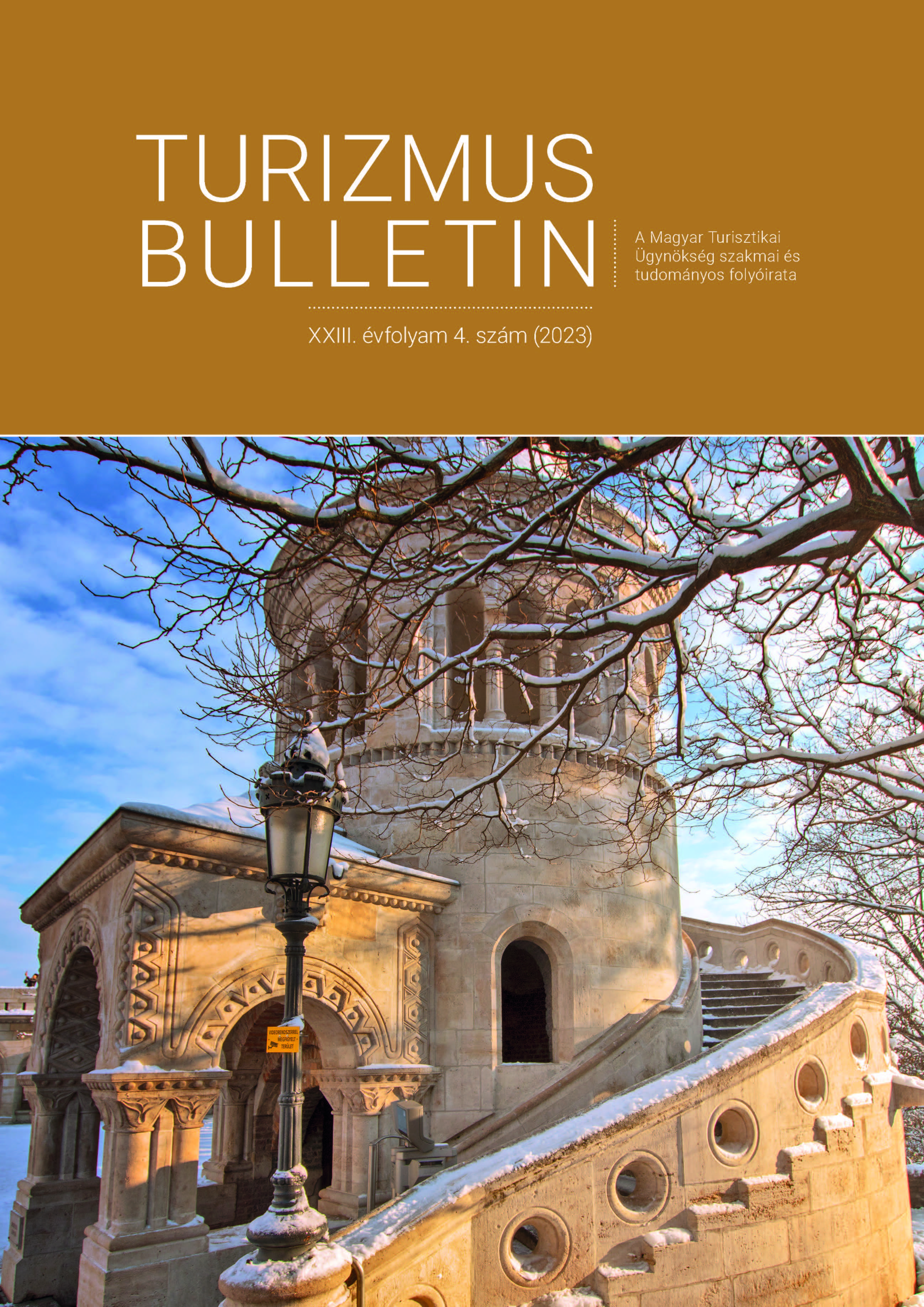An analysis of attitudes towards domestic music festivals among the members of Generation Z
DOI:
https://doi.org/10.14267/TURBULL.2023v23n4.3Keywords:
events industry, festival tourism, Generation Z, visitor motivationAbstract
Festivals are becoming ever more popular, particularly music festivals, which have seen significant changes during the last two decades. Based on the visitors, it can be stated that these events are primarily attended by the younger generation. Consequently, the purpose of this study is to analyse the attitudes of Generation Z towards music festivals. Focus group interviews were conducted as part of a qualitative study to learn more about the target group’s perspectives. The participants were divided into three groups based on the frequency of their attendance. The findings of primary research suggest that for young people, the performers, the company, and the experience are the key motivators for attending a festival, whereas high prices, crowds and a lack of company limit their willingness to attend the events. The study concludes with practical suggestions that festival organisers might use to reach out to potential audiences in the future.
References
DANYI P. – IVÁNYI T. – VERES I. (2020): A turizmus jelene és várható változása a mesterséges intelligencia integrálásával, különösen a Z-generáció igényeire fókuszálva. Vezetéstudomány – Budapest Management Review. 51(különszám). pp. 19–34. https://doi. org/10.14267/VEZTUD.2020.KSZ.03
DENK, J. – BURMESTER, A – KANDZIORA, M. – CLEMENT, M. (2022): The impact of COVID-19 on music consumption and music spending. PLoS ONE. 17(5). e0267640. https://doi. org/10.1371/journal.pone.0267640
DING, H. – HUNG, K. (2021): The antecedents of visitors’ flow experience and its influence on memory and behavioral intentions in the music festival context. Journal of Destination Marketing and Management. 19. 100551. https:// doi.org/10.1016/j.jdmm.2020.100551
GŐSI ZS. – BÁRDOS GY. – MAGYAR M. (2020): Sokszínű rekreáció II.: Egészségmegőrzés - Életkorok – Képzés. Akadémiai Kiadó, Budapest. https:// doi.org/10.1556/9789634546092
GURSOY, D. – SPANGENBERG, E. R. – RUTHERFORD, D. G. (2006): The hedonic and utilitarian dimensions of attendees’ attitudes toward festivals. Journal of Hospitality & Tourism Research. 30(3). pp. 279–294. https://doi. org/10.1177/1096348006287162
HINEK M. – KULCSÁR N. (2019): A fesztiválélmény megjelenése a közösségi médiában: a Sziget Fesztivál példája. Turizmus Bulletin. 19(3). pp. 4–12. https://doi.org/10.14267/ TURBULL.2019v19n3.1
IVÁNYI, T. – BÍRÓ-SZIGETI, S. (2020): Understanding internal connections of music festivals’ experience dimensions. Tourism and Hospitality Management. 26(2). pp. 437–454. https://doi.org/10.20867/thm.26.2.9
KÁNTOR SZ. (2019): Kultúra fogyasztási szokások felsőoktatási intézményben tanulók körében. II. Nemzetközi Turizmus Konferencia, Turizmus, Fogyasztás, Generációk, Tanulmánykötet. Pécsi Tudományegyetem Közgazdaságtudományi Kar, Pécs. pp. 35–44.
KAZÁR K. (2014): Fesztivállátogatást befolyásoló tényezők vizsgálata fókuszálva a márka szerepére. In: Hetesi E. – Révész B. (szerk.): „Marketing megújulás” Marketing Oktatók Klubja 20. Konferenciája előadásai. Szegedi Tudományegyetem Gazdaságtudományi Kar, Szeged. pp. 49–60.
KAZÁR K. (2015): Lojalitást meghatározó tényezők feltárása zenei fesztiválok esetén fókuszálva a márka szerepére. Marketing & Menedzsment. 49(3). pp. 36–49.
LEONE, L. – MONTANARI, F. (2021): The impact of festivals on the image of a cultural industry: The case of the new Italian dance platform. Poetics. 92(B). pp. 1–15. https://doi.org/10.1016/j. poetic.2021.101630
LŐRINCZ K. – SULYOK J. (2017): Turizmusmarketing. Akadémiai Kiadó, Budapest. https://doi. org/10.1556/9789634540601
PORTUGAL, J. P. – CORREIA, A. – ÁGUAS, P. (2022). Decisions on participation in music festivals: an exploratory research in Portugal. International Journal of Event and Festival Management. 13(2), pp. 164–181. https://doi. org/10.1108/IJEFM-07-2021-0059
SÜLI D. – MARTYIN-CSAMANGÓ Z. (2017): A közösségi média szerepe a fesztiválturizmusban – a Szegedi Ifjúsági Napok és a Green Future példáján. Turizmus Bulletin. 17(3–4). pp. 24–32. https://doi.org/10.14267/TURBULL.2017v17n3-4.3
SZABÓ J. – HIRES-LÁSZLÓ K. (2016): Régi és új kultúra. In: Székely L. (szerk.): Magyar fiatalok a Kárpát-medencében – Magyar Ifjúság Kutatás 2016. Kutatópont Kft., Budapest. pp. 315–348.
VERES Z. – HOFFMANN M. – KOZÁK Á. (2016): Bevezetés a piackutatásba. Akadémiai Kiadó, Budapest. https://doi. org/10.1556/9789634540038
Internetes források
IFJÚSÁGKUTATÓ INTÉZET (2023): Készülnek a fesztiválszezonra a fiatalok. https://ifjusagkutatointezet.hu/kiadvany/keszulnek-a-fesztivalszezonra-a-fiatalok Letöltve: 2023. május 29.
MTÜ (MAGYAR TURISZTIKAI ÜGYNÖKSÉG) (2021): Nemzeti Turizmusfejlesztési Stratégia 2030 – Turizmus 2.0. https://mtu.gov.hu/documents/ p rod/ NTS2030_Tu rizmu s2.0 -St rategia.pd f Letöltve: 2022. április 8.
NRC PIACKUTATÓ (2008): A kultúra iránt is érdeklődnek a fesztiválozó fiatalok. https://nrc. hu/egyeb/a-kultura-irant-is-erdeklodnek-afesztivalozo-fiatalok/ Letöltve: 2022. április 11.
SZÉKELY L. – SZABÓ A. (2017): Magyar ifjúság kutatás 2016: az ifjúságkutatás első eredményei. Új Nemzedék Központ. http://www.ujnemzedek.hu/ sites/default/files/magyar_ifjusag_2016_a4_web. pdf Letöltve: 2022. április 11

